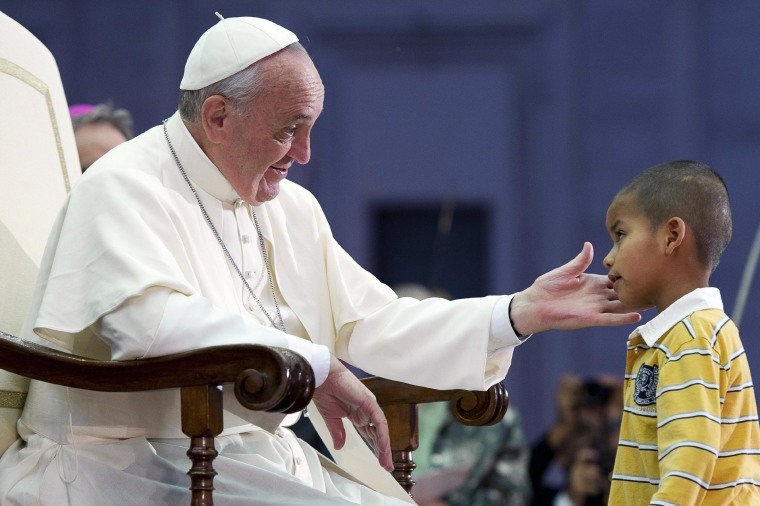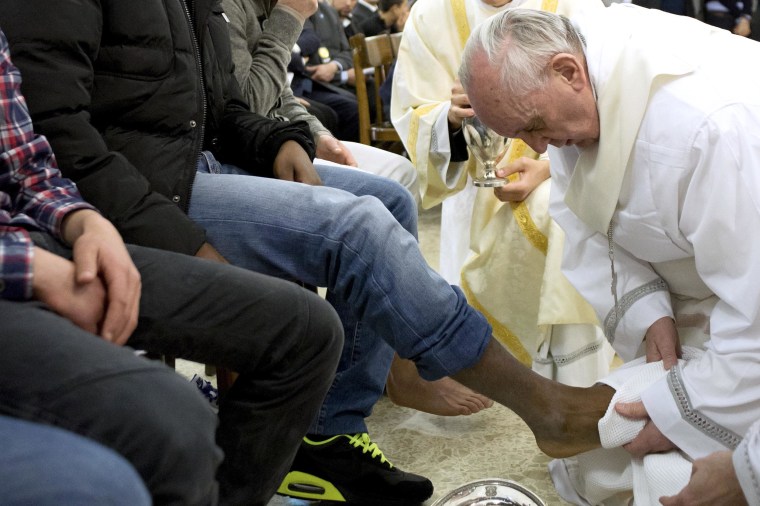ROME – He inherited a church in a moment of crisis, rocked by years of accusations of sexual abuse and the faithful fleeing the faith.
A year after Cardinal Jorge Mario Bergoglio of Argentina was elected as Pope Francis, he has revamped the Catholic Church’s image by embodying its humble ideals.
But while his media friendly smile, people skills and down-to-earth attitude have provided a much needed public relations boost to the beleaguered Catholic Church, his lasting contributions could well be more subtle but no less revolutionary.
Just a ‘normal person’
A modern Catholic icon, Francis made it to the cover of Rolling Stone magazine, was turned into a comic book hero, and was depicted as a “superpope” by a graffiti artist.
The only Catholic who doesn’t seem to be fawning over Pope Francis is the pope himself.
“I don’t like ideological interpretations, a certain myth behind Pope Francis,” he said in a March 5 interview with Italian newspaper Corriere della Sera.
“To paint the Pope as some sort of superman, a sort of star, seems offensive to me. The pope is a man who laughs, cries, sleeps tranquilly and has friends like everyone else. A normal person.”
Francis may be a reluctant hero, but his mission to bring his flock back to the pews is of heroic proportions.
While no official figures on increased church attendance are available, he has brought the faithful back to St. Peter’s Square.
According to the Vatican, from March to December 2013, more than 6 million people attended liturgical events presided over by him. That’s three-fold increase from the previous year, when about 2 million came to see Pope Benedict XVI.

Cleaning house
Being the first non-European pontiff in about 1,300 years, and the first from South America, may have made Francis' effort to decentralize power away from the Vatican a little easier. One month after his election he took the unprecedented step of setting up a group of eight cardinals from all continents to advise him.
“It’s a fundamental shift in the way the church is going to be governed. It’s a move towards much greater financial transparency”
“Excessive centralization, rather than proving helpful, complicates the church’s life and her missionary outreach,” the pope wrote in “The Joy of the Gospel,” his first official “apostolic exhortation.”
The insular and mainly Italian Roman Curia was widely blamed for the vicious in-fighting, power-struggle and cronyism detailed in the hundreds of memos leaked by Pope Benedict XVI’s butler to the media.
But many analysts would say the most remarkable action taken by Francis in his first year as pontiff has been cleaning house at the controversial Institute for Works of Religion, also known as the Vatican Bank.
The bank earned a reputation over the years as a secretive financial institution accused of corruption, money laundering and lack of transparency. In February, Francis announced the creation of a Secretariat for the Economy, a ministry in charge of Vatican finances.
“The recent creation of a new office in the roman curia to supervise all economic matters is by Vatican standards an earthquake,” said George Weigel, NBC News’ Vatican analyst.
“It’s a fundamental shift in the way the church is going to be governed. It’s a move towards much greater financial transparency.”

'Who am I to judge?'
Francis has also struck a chord by taking on social issues that were taboo.
An off-the-cuff remark to reporters on a flight back from World Youth Day in Rio de Janeiro in July won over many critics who had dismissed the church as close-minded.
“If a person is gay and seeks God and has good will, who am I to judge him?” Francis said.
“I am happy Pope Francis put an end to the demonization, but I doubt the dogma on homosexuality will change anytime soon.”
Gay Catholics around the world took hope from the pope’s comment that he might rethink the Church’s unforgiving stance against homosexuality.
“It’s a big step forward from Benedict XVI, who said homosexuality was an abomination, and even that’s it’s a threat to justice and peace,” said Pasquale Quaranta, an gay ex-seminarist and author of a book “Homosexuality and the Gospel.”
“But let’s be realistic. I am happy Pope Francis put an end to the demonization, but I doubt the dogma on homosexuality will change anytime soon.”
The pope nevertheless started a conversation about formerly taboo subjects, launching a worldwide survey on how Catholics rate the church’s teachings on abortion, birth control, homosexuality and same-sex marriage.
The study's outcome will be discussed at a synod of bishops in October.
Vatican expert Weigel warns against expecting drastic changes as a result.
“People have read into Pope Francis and his genuine human attractiveness a lot of their own hopes and fears. But he is a son of the church, he believes in what the church believes and teaches.”
Still work to be done
While Francis has gotten credit for even discussing changing social mores, one of his most difficult tasks will be to change public opinion when it comes to clerical sexual abuse.
In February, the United Nations committee on the Rights of the Child published an unprecedented and damning report on the Vatican’s handling of “tens of thousands” of child abuse cases, accusing the Catholic Church of not doing enough to bring the abusers to justice.
“Despite the U.N.’s recommendation to remove known predators, he hasn’t done that. That’s why children are not safer today than they were one year ago, when he became pope.”
Francis, who in January set up a set up a new commission to protect children from sex abuse and help victims, defended the church’s actions in his most recent interview with Corriere della Sera.
“[Benedict XVI] was very brave and paved the way forward. Following this path, the Church achieved a lot. Maybe more than anybody,” he said.
“The Catholic Church is possibly the only public institution that acted with transparency and responsibility. Nobody else did more. Still, the Catholic Church was the only one to come under fire.”
This assessment did not sit well with Barbara Blaine, the president of SNAP, the survivor network of those abused by priests based in Chicago.
“It was heartbreaking to see the true colors of Pope Francis,” she said. “The church has a horrific track record in moving predators, promoting enablers and destroying evidence.
“Despite the U.N.’s recommendation to remove known predators, he hasn’t done that. That’s why children are not safer today than they were one year ago, when he became pope.”
Pope Francis may have gone from a virtual unknown to Time Magazine’s “Man of the Year" since his election on March 13, 2013, but he clearly hasn't won over everybody.